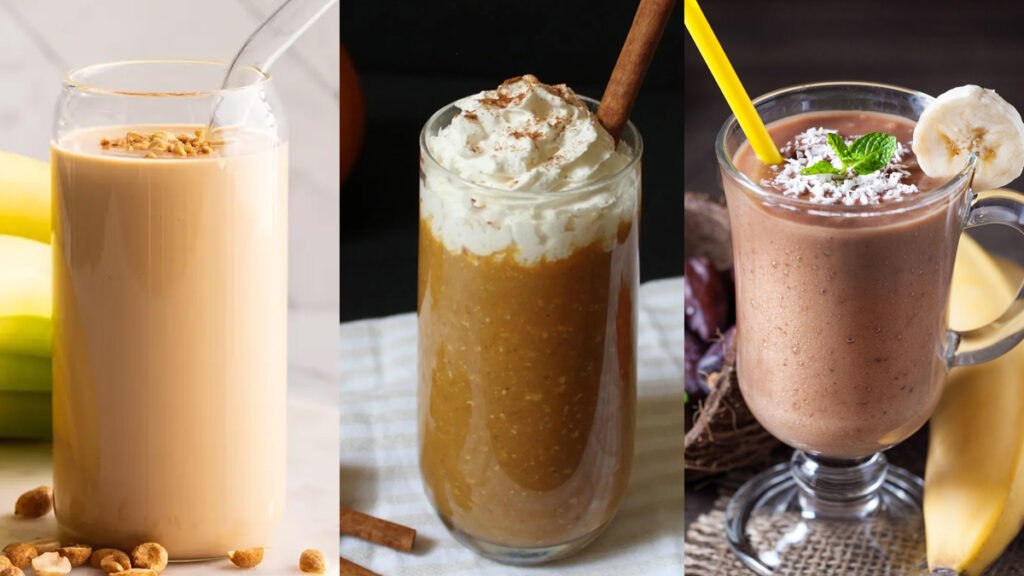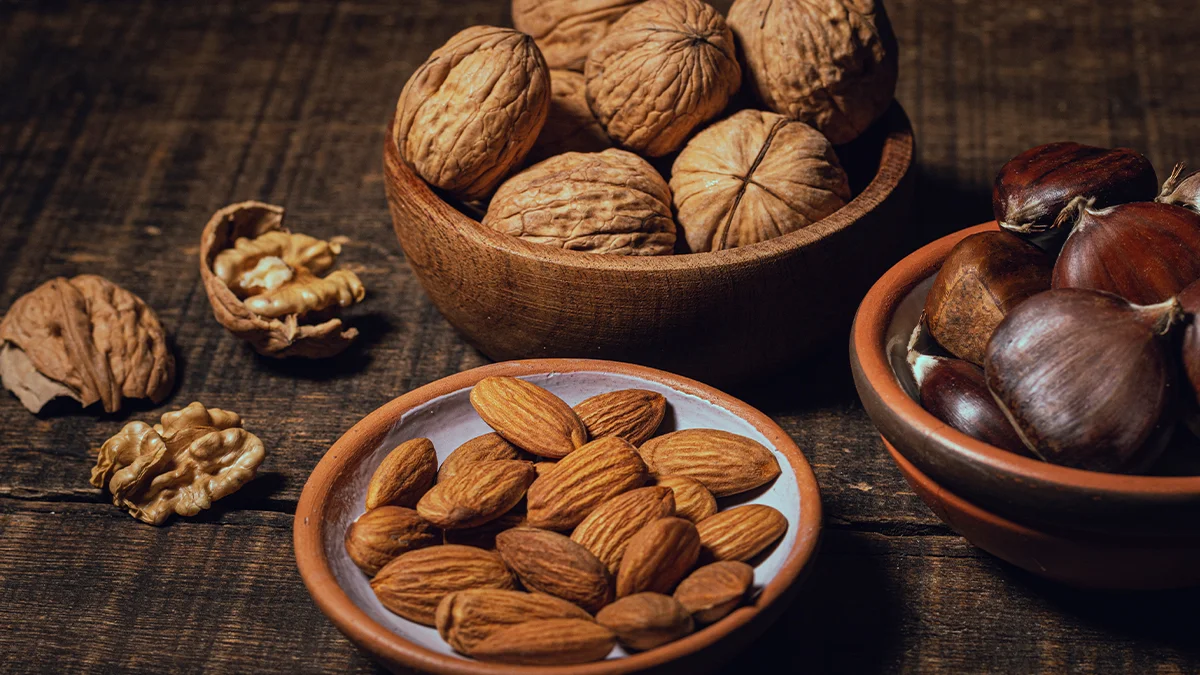
About 5.3 million nuts are sold every year. Many Nuts are cheap, even the most famous nuts may be expensive health foods in the world. It is because they get more expensive and harder they are to source, farm, and store. In this article, we will explore the 10 most expensive nuts in the world and their benefits and also their Nutrition.
List of The 10 Most Expensive Nuts in the World
- Macadamia.
- Pistachios.
- Cashew.
- Almond.
- Chestnut.
- Pine nuts.
- Brazilian nut.
- Pecan.
- Walnut.
- Hazelnut.
1. Macadamia

Macadamia nuts are rich in healthy fats that help those who want to lose weight. Macadamia nuts have many health benefits, like dietary fiber, protein, and other nutrients.
Macadamia nuts have fat that is higher than that of other expensive nuts such as almonds, cashews, and walnuts. Macadamia’s 50-gram pack of nuts has 38 grams of fat.
However, macadamia nuts have around 80% of the fat which is monounsaturated fat for health benefits. These nuts also include specific types of monounsaturated fatty acids (MUFAs), which are not contained in much other nutrition.
Macadamia nuts are also a low glycemic index food that has many health benefits, macadamia nuts can be included in any healthful diet.
Buy Macadamia at cheap price – https://amzn.to/40upFW3
Nutritional value is in a cup or 132 trusted Sources of macadamia nuts include:
- 945 calories
- 10.3 g of protein
- 100 g of fat
- 16.9 g of carbohydrate
- 10.6 g of fiber
- 5.46 g of sugar
- 92.4 milligrams (mg) of calcium
- 3.5 mg of iron
- 156 mg of magnesium
2. Pistachios

Pistachios nuts are like seeds usually green, and taste just sweet.
Pistachios are a healthy addition to your diet that is made up of 20% protein, a much higher calorie-to-protein ratio than most nuts. This protein helps you feel full longer and manage your weight.
Pistachios have high antioxidants that help fight against free radicals, which are compounds in your body that can damage cells, proteins, and DNA, causing early aging illnesses like cancer, diabetes, and heart disease.
Pistachio nuts have unsaturated fatty acids and potassium both having antioxidant and anti-inflammatory qualities.
Buy Pistachio at cheap price – https://amzn.to/4086Pnk
Pistachio Nutrition
A 1-ounce of pistachios (about 49 kernels) has 159 calories with:
- 5.72 grams of protein
- 7.7 grams of carbs
- 12.85 grams of fat
- 3 grams of fiber
Pistachio nuts are cholesterol-free with a great source of vitamins and minerals, having:
- Manganese
- Phosphorous
- Copper
- Vitamin B6
- Thiamine
They also fill a punch of potassium. A 2-ounce has more potassium than a big banana or fiber as a cup of cooked broccoli.
3. Cashew

Cashew seed has a soft texture and a sweet flavor with good source of protein and minerals as part of a balanced diet.
Cashew is generally eaten as food. It is used to make medicines such as diabetes, high cholesterol, heart disease, stomach and intestinal (gastrointestinal) ailments, skin problems, and other diseases, but there is no good scientific evidence to support this.
Cashew nuts have chemicals that might perform against certain bacteria. Some fats included in cashews might help to reduce cholesterol levels in the blood.
Buy Cashew at cheap price – Cashew
Cashew Nutrition
Cashews have substantial amounts of essential nutrients:
calories: 166 kilocalories (kcal)
carbohydrates: 8.99 g
protein: 4.21 g
fiber: 0.82 g
total fat: 13.6 g
calcium: 12.5 milligrams (mg)
copper: 0.61 mg
iron: 1.65 mg
magnesium: 71.4 mg
phosphorous: 135 mg
potassium: 155 mg
sodium: 4.54 mg
zinc: 1.54 mg
4. Almond
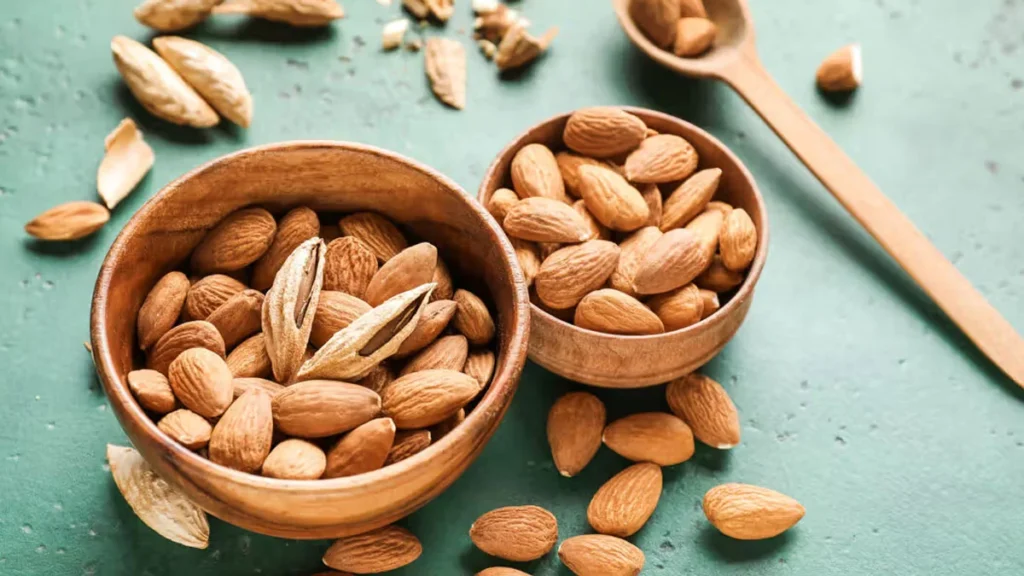
An almond is like a seed from a fruit from an almond tree. The fruit has a hard shell, like a hole, with the almond seed inside considered nuts.
Almonds production is about 80% in California. Almond nuts are used in foods and even as added flavor in drinks in overall world.
Almonds like a healthy punch, if you’re looking for an addition to your diet that fills a, a small serving of almonds.
Buy Almond at cheap price – https://amzn.to/4gNAPMe
Nutrition
Almonds have plenty of nutrients like other expensive nut.
An ounce of whole almonds has:
- Calories: 152
- Protein: 6 grams
- Fat: 15 grams
- Carbohydrates: 6 grams
- Dietary fiber: 3 grams
- Sugar: 1 gram
Almonds are also the perfect source of vitamins and minerals like:
- Vitamin E
- Vitamin B2
- Magnesium
- Phosphorus
- Potassium
5. Chestnut
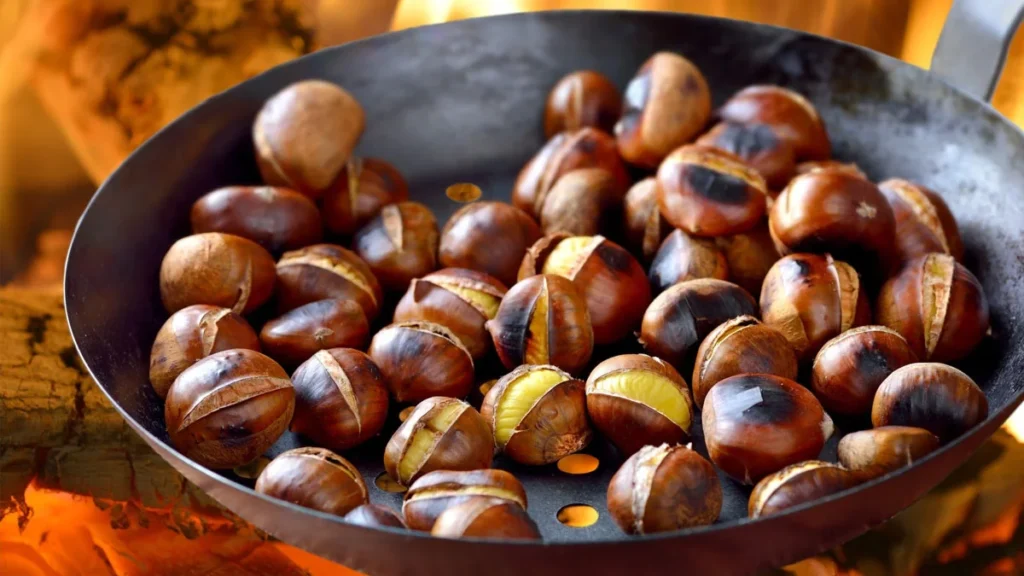
Chestnut is a sweet edible nut from deciduous trees or shrubs in the genus Castanea, in the beech family Fagaceae. It also refers to the edible nuts they produce.
Chestnuts have low fat, high in vitamin C similar to fruits, unlike real nuts. They have a tipped husk with a dark brown shell, both must be removed before eating.
Chestnuts can be used for eaten raw, roasted, ground into flour, or pastries. These are rich in vitamin C. Chestnuts lose some vitamin C if you boil or roast. Chestnuts have more vitamin C when cooking, you roast them at lower temperatures or utilize a food dehydrator to dry them.
Chestnuts remain a good source of antioxidants, after cooking.
Nutrition
Chestnuts have fewer calories than other nuts. It is a good source of amino acids, monounsaturated fatty acids, antioxidants, phenols, and vitamin C.
Chestnuts are filled with vitamins and minerals such as:
- Vitamin C
- Vitamin E
- Vitamin A
- Vitamin B complex
- Calcium
- Magnesium
- Zinc
- Iron
- Copper
- Manganese
One quarter-cup of raw chestnuts have nutrients per serving:
- Calories: 77
- Protein: 1 gram
- Fat: 1 gram
- Carbohydrates: 17 grams
- Fiber: 3 grams
- Sugar: 0 grams
- Cholesterol: 0 milligrams
- Sodium: 1 milligram
For comparison, one quarter-cup of roasted chestnuts have:
- Calories: 88
- Protein: 1 gram
- Fat: 1 gram
- Carbohydrates: 19 grams
- Fiber: 2 grams
- Sugar: 4 grams
- Cholesterol: 0 milligrams
- Sodium: 1 milligram
6. Pine nuts
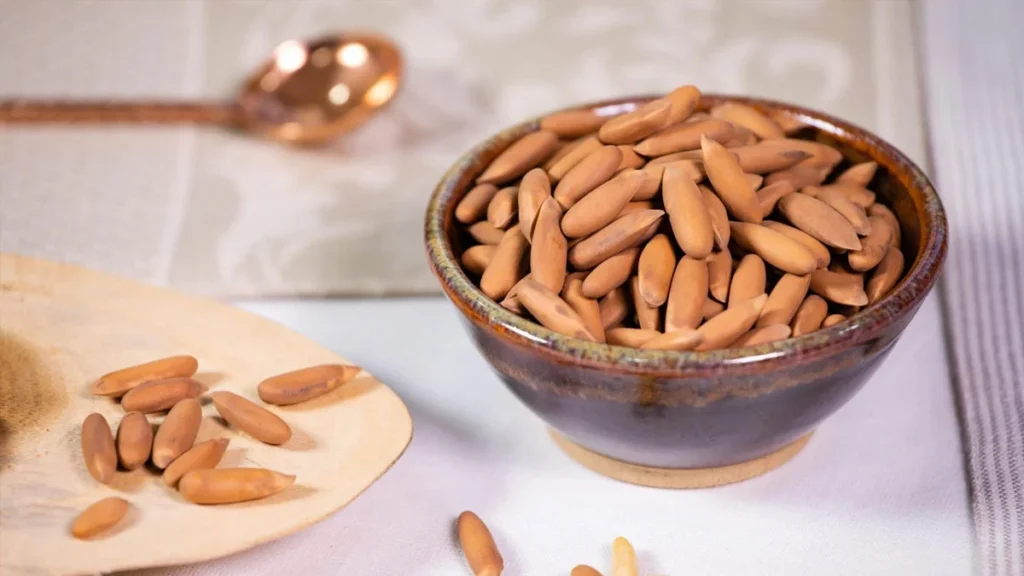
Pine nuts, also named piñón, pinole, or pignoli, are edible seeds like the teardrop-shaped, tasty little nut that is usually used in making pesto and in other dishes. Pine nuts are also like another seed that is the inner, usually edible part of a hard, inedible nut casing.
Pine nuts are one of the most expensive nuts in the world because of the time needed to grow the nuts with the effort to harvest the seeds from their protective encasement.
Nuts and seeds are a nutritious addition to almost any meal plan with the higher fat providing unique benefits that are worth it.
Pine nuts have a good balance of protein, fats, and fiber to help maintain blood sugar levels stable. Pine nuts have healthy micronutrients for diabetes control as well.
Pine nuts are rich in magnesium help to improve glucose uptake by insulin and lower hemoglobin A1c levels, a key quality of blood sugar control.
Buy Pine nuts at cheap price – https://amzn.to/3WbBQpe
Pine Nut Nutrition
1 ounce (28g) of dried pine nuts (approximately 167 kernels).1
- Calories: 191
- Fat: 19g
- Sodium: 0.6mg
- Carbohydrates: 3.7g
- Fiber: 1.1g
- Sugars: 1g
- Protein: 3.9g
- Magnesium: 71mg
- Zinc: 1.8mg
- Iron: 1.6mg
- Manganese: 2.5mg
- Vitamin E: 2.6mg
- Vitamin K: 15.3mcg
7. Brazilian nut
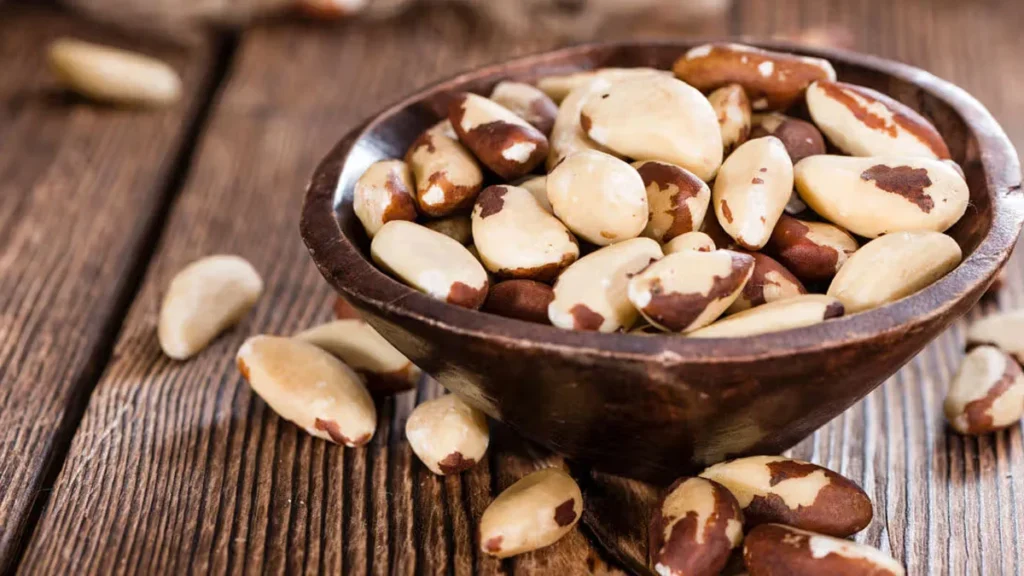
Brazilian nuts are in tough, triangular shells, known to have a smooth texture and a light, almost buttery taste.
Brazil nuts, come from the Bertholletia excelsa tree that grows in the Amazon rainforest. The trees have relatively large, hard-shelled fruits that compare to coconuts, which have anywhere from 10 to 24 edible seeds.
Brazil nuts may provide important health benefits because these are a great source of selenium, but be alert not to eat Brazil nuts too many in one day.
Buy Brazilian nut at cheap price – https://amzn.to/4acm6Ih
Brazil Nuts Nutrition:
A 1-ounce serving has almost 1,000% of your recommended daily allowance of selenium. A single nut contains 96 micrograms more than many other nuts. Brazil nuts have other nutrients like:
- Vitamin B1
- Vitamin B6
- Vitamin E
- Calcium
- Copper
- Magnesium
- Manganese
- Phosphorous
- Zinc
8. Pecan Nuts

The pecan is an edible nut from hickory trees born in northern Mexico and the southern United States. The nut is filled with nutrients like vitamins and minerals.
Raw pecans pack a 1-2-3 punch of protein, healthy fats, and fiber that can help keep you energized and satisfied
Pecans are a great source of vitamins, protein, healthy fats, and fiber. For those able to eat nuts serve pecans as part of your snacks and meals.
Raw pecan nuts are cholesterol-free, sodium-free, and lower in carbohydrates with their rich, buttery flavor and natural sweetness.
Buy Pecan Nuts at cheap price – https://amzn.to/3DNxWws
Pecan Nutrition:
Pecan nuts have great vitamins and minerals for our healthy skin, eyes, teeth, bones, muscles, and nerves.
- Vitamin A
- Folate
- Niacin
- Riboflavin
- Thiamine
- Vitamin B6
- Vitamin E
- Calcium
- Iron
- Magnesium
- Manganese
- Phosphorus
- Zinc
Nutrients per serving
One ounce of raw pecans, or 19 halves, contains:
- Calories: 196
- Total fat: 20.4 grams
- Monounsaturated fat: 11.6 grams
- Polyunsaturated fat: 6.1 grams
- Cholesterol: 0 milligrams
- Sodium: 0 milligrams
- Carbohydrates: 3.9 grams
- Dietary Fiber: 2.7 grams
- Sugar: 1.1 grams
- Protein: 2.6 grams
9. Hazelnut:
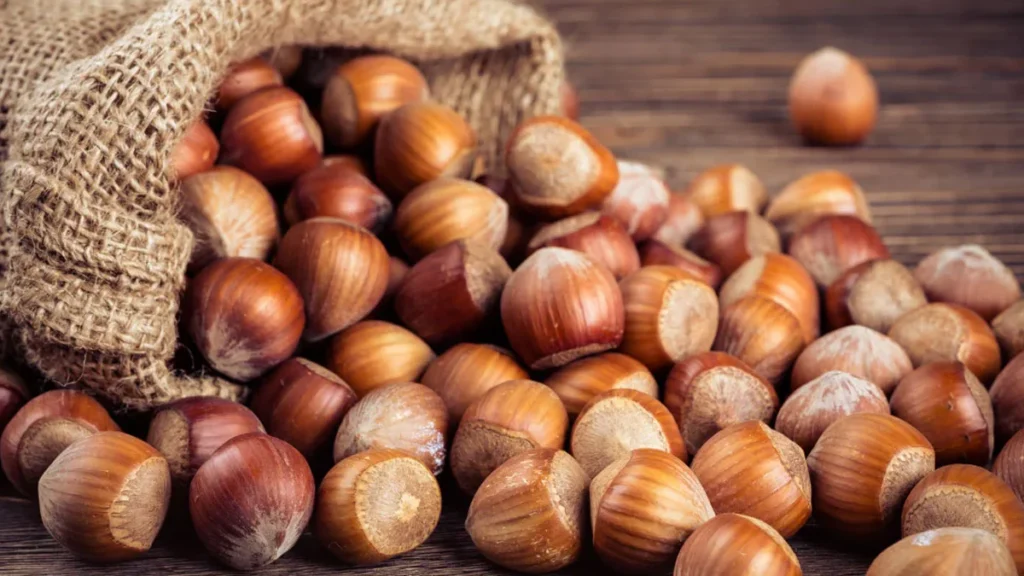
Hazelnut is from the hazel tree (Corylus avellana) rich in monounsaturated fatty acids. It is generally eaten as food.
Hazelnuts have oil, protein, fiber, and antioxidants and the antioxidants in hazelnuts might help in heart health. Hazelnuts are also used for obesity, high cholesterol, heart disease, dementia, and other purposes by people, but there is no good scientific evidence to use them.
Buy Hazelnut at cheap price – https://amzn.to/4j7rLTY
Nutrition
Hazelnuts are a cholesterol-free energy source that is filled with healthy fats, including omega-3s, which can be useful for your heart.
Hazelnuts also have nutrients like:
- Vitamin E
- Thiamin
- Magnesium
- Copper
- Manganese
- Vitamin B6
- Folate
- Phosphorus
- Potassium
- Zinc
10. Walnuts
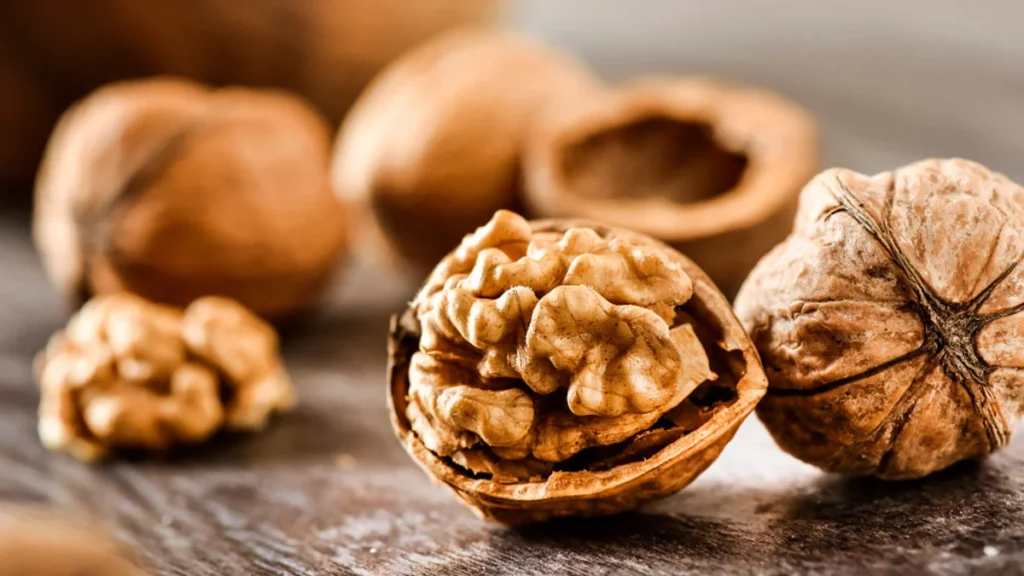
Walnuts are seeds from the shell of a fruit that grows on a walnut tree.
Walnuts have been a beloved snack. The Romans considered the nut could neutralize poison and treat skin diseases.
Walnuts are used in traditional Chinese medicine:
- Detox the kidneys
- Nourish the blood
- Promote digestive health
Walnuts look bumpy and golden brown with a mild, earthy, and slightly tangy flavor.
Buy Walnuts at cheap price – https://amzn.to/4j1JPz7
Walnut Nutrition Facts
One serving of English walnuts, which includes 1 ounce or about seven walnuts, has:
- 185 calories
- 2.5 grams of monounsaturated fat
- 1.7 grams of saturated fat
- 4.3 grams of protein
- 3.9 grams of carbohydrates
- 1.9 grams of fiber
- 0.7 grams of sugar
This small serving size can keep a big nutritional benefit.
Walnuts are also an excellent source of:
- Iron
- Zinc
- Copper
- Selenium
- Vitamin C
- Niacin.
Walnut oil also is a good source of:
- Vitamin K
- Vitamin E
- Choline
- Phosphorus
- Zinc
Walnut oil has high selenium and this antioxidant helps healthy thyroid function and reduces your risk of cognitive decline, heart disease, and cancer.
Also Read – 10 Most Beautiful Women in the World 2024
Conclusion
The most expensive nut is not only the most delicious. These nuts getting process is difficult. Most edible nuts are filled with vitamins and minerals. They are beneficial for your health and used as useful supplements in the diet, as well as in the cosmetic industry.


